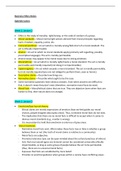Business Ethics Notes
Gabriele James
Week 1: Lecture 2
• Ethics is the study of morality, right/wrong, or the code of conduct of a group.
• Moral standards = Moral norms/right actions derived from moral principles regarding
harm, freedom, equality, justice, etc.
• Immoral/unethical = An act which is morally wrong/falls short of a moral standard. The
act is ethically impermissible.
• Amoral = An act to which no moral standards apply (primarily self-regarding, possibly
prescriptive language). The act is morally permissible.
• Amoral issues may appear to be moral issues due to strong emotions.
• Moral/ethical = An act which is morally right/meets a moral standard. The act is morally
permissible and morally required (not doing it is impermissible).
• Supererogatory = An act which exceeds a moral standard. The act is morally permissible,
but not morally required (you are not obliged to perform them, seen as heroic).
• Descriptive claims = Describe how things are.
• Normative claims = Prescribe what ought to be the case.
• Some normative questions have obvious answers. Even when answers are difficult to
find, it doesn’t mean they don’t exist (therefore, normative moral facts do exist).
• Moral facts = Moral/ethical claims that are true. They are objective (even when facts are
harder to find, their nature does not change).
Week 1: Lecture 3
• Emotivism/boo-hurrah theory:
- Ethical claims are merely expressions of emotion (how we feel guides our moral
choices, people disagree about grey areas). Thus, normative moral facts do not exist.
- The implication that there are no moral facts is difficult to accept when it comes to
obvious moral standards (e.g., murder is wrong).
- It is inconsistent to hold that emotivism is only true of grey areas.
• Moral relativism:
- Normative moral facts exist. What makes these facts true or false is whether a group
believes them or not (the truth of moral claims is relative to a community).
- Moral facts are subjective.
- Promotes tolerance (you can be open-minded about the cultural practices of others).
- Acts that most would agree are immoral cannot be considered universally ethically
impermissible, as long as some group of people believe the act to be permissible
(thus, there are no universal moral facts).
- Espouses that facts are established by mere belief.
- Provides no practical guidance when groups within a society have conflicting views.
, • Doctrine of divine command:
- Normative moral facts are determined by the will of god.
- Moral facts are subjective.
- The dilemma is that we don’t know whether morality is willed by god because it is
moral, or whether it is moral because it is willed by god.
- If god’s will were different, then moral standards would be different.
- If there are some things we can’t imagine god willing, it suggests that morality is
independent of god’s will.
- Rejecting divine command theory doesn’t refute god’s omnipotence (it has limits).
• The best tool to discover moral facts is critical thinking.
• We can’t be ethical by simply following the law, because the law can require/permit
immoral acts, and the law requires interpretation.
• Even if religion is not a source of moral truths, it may be a good place starting point to
seek ethical guidance. We should apply critical thinking where religious advice must be
interpreted to apply to a specific moral dilemma.
• Following your gut/intuition may not always push you in the right direction, as it is
influenced by various irrelevant factors (e.g., mood, experiences), and does not give us
access to reasons for our actions.
Week 2: Lecture 1
• Critical thinking = The ability to apply the methods of logical reasoning/argumentation.
• Scepticism = Consideration of the value of conventional ideas; a dedication to only
accepting answers that are supported by sound arguments.
• Logical reasoning = Giving good reasons to accept our arguments.
• Structure of an argument:
- Conclusion (the claim you are giving reasons in support of).
- Premise/s (the reasons you are giving to support your argument).
- We formalise arguments to see the relationship between the conclusion and
premise/s, and to find where the problem lies before refuting an argument.
• Valid argument = If the provided premise/s are true, the truth of the conclusion is
guaranteed (conclusion follows from premise/s, or premise/s entail conclusion).
• Valid arguments can be absurd (if the premise/s are not, in fact, true).
• Deductive argument = Making an inference based on widely-accepted facts/premises.
Guarantee that the conclusion is true if the premises are true.
• Validity of deductive arguments:
- A = B. B = C. Therefore, A = C.
- If A, then B. A. Therefore, B (modus ponens).
• Sound argument = Valid arguments with true premises.
• Proving arguments to be unsound/testing for soundness:
- Show that the argument is invalid.
- Show that the premise/s are not necessarily true.





